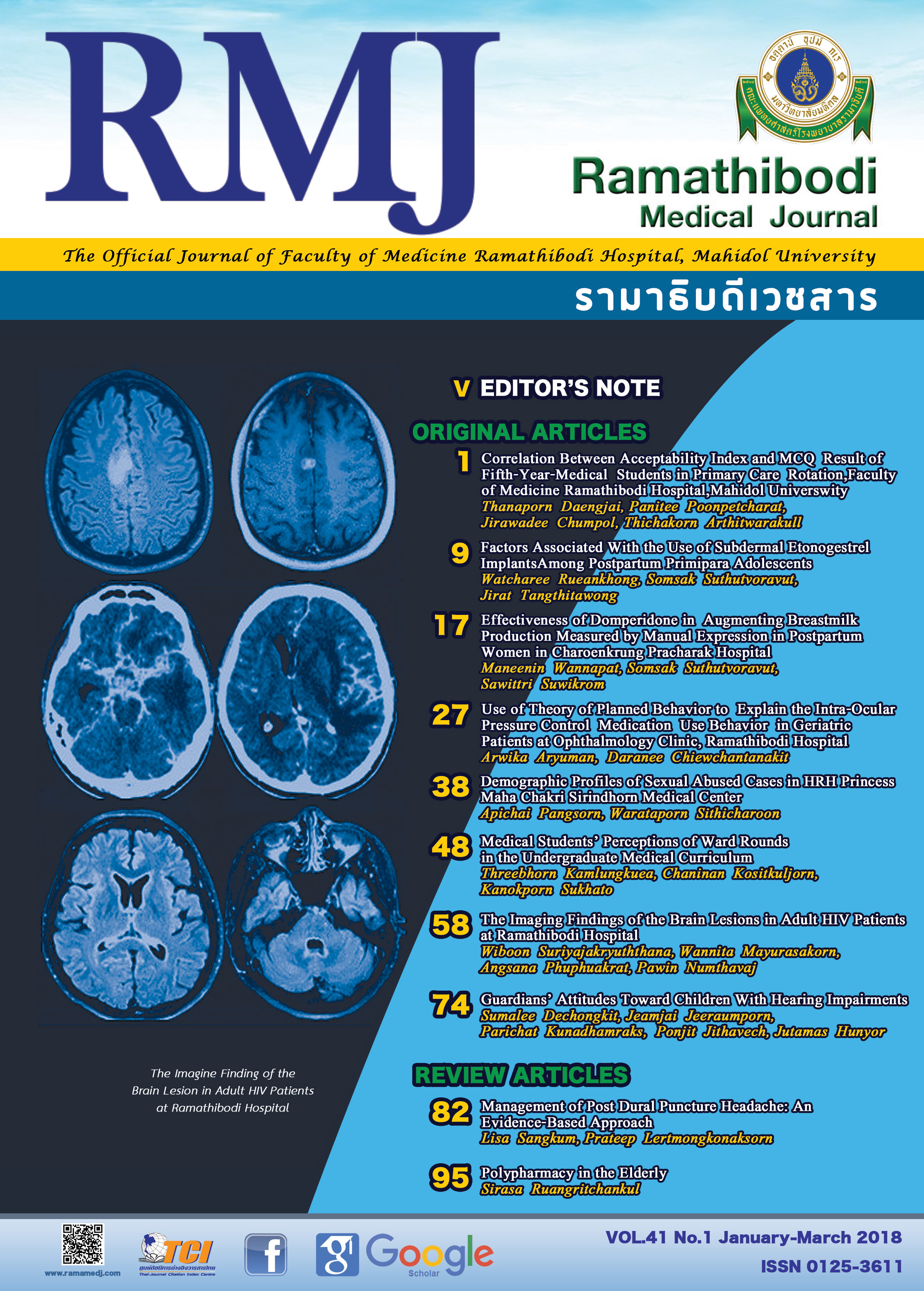Medical Students’ Perceptions of Ward Rounds in the Undergraduate Medical Curriculum
DOI:
https://doi.org/10.14456/rmj.2018.6Keywords:
Ward round, Undergraduate medical students, Qualitative studyAbstract
Background: Ward rounds are widely regarded as an essential part of undergraduate medical training by presenting students with various tasks and roles they will need as future doctors. However, very few studies have examined this subject from the perspective of the medical students.
Objective: To explore medical students’ perceptions of ward rounds and examine perceived barriers to learning and review possible strategies to increase the effectiveness of this approach.
Methods: The fourth-year medical students (n = 30) at the Faculty of Medicine Ramathibodi Hospital, Mahidol University attended five focus groups. Discussions were audio-taped, transcribed and analyzed using qualitative methods.
Results: The fourth-year medical students viewed ward rounds as being important for their learning and future practice. Wide variations in student experience were reported but ward rounds were felt to be under-utilized. Factors enhancing or obstructing student learning from ward rounds were categorized into three groups (instructor, environment, student) and administrative strategies were identified that could increase the effectiveness of this component of the curriculum.
Conclusions: The medical students viewed ward rounds as occupying an important place in the undergraduate medical curriculum and understood that there were many factors affecting the effectiveness of learning from this exercise. While having to balance education with patient care, the Faculty of Medicine should consider management changes to maximize the benefits to students from attending ward rounds.
References
Gonzalo JD, Masters PA, Simons RJ, Chuang CH. Attending rounds and bedside case presentations: medical student and medicine resident experiences and attitudes. Teach Learn Med. 2009;21(2):105-110. doi:10.1080/10401330902791156.
Mel-B KA. What is happening to bedside clinical teaching? Med Educ. 2002;36(12):1185-1188.
Seo M, Tamura K, Morioka E, Shijo H. Impact of medical round on patients’ and residents’ perceptions at a university hospital in Japan. Med Educ. 2000;34(5):409-411.
Nair BR, Coughlan JL, Hensley MJ. Impediments to bed-side teaching. Med Educ. 1998;32(2):159-162.
Williams KN, Ramani S, Fraser B, Orlander JD. Improving bedside teaching: findings from a focus group study of learners. Acad Med. 2008;83(3):257-264. doi:10.1097/ACM.0b013e3181637f3e.
Nikendei C, Kraus B, Schrauth M, Briem S, Junger J. Ward rounds: how prepared are future doctors? Med Teach. 2008;30(1):88-91. doi:10.1080/01421590701753468.
Laskaratos FM, Wallace D, Gkotsi D, Burns A, Epstein O. The educational value of ward rounds for junior trainees. Med Educ Online. 2015;20(1):27559. doi:10.3402/meo.v20.27559.
Swenne CL, Skytt B. The ward round--patient experiences and barriers to participation. Scand J Caring Sci. 2014;28(2):297-304. doi:10.1111/scs.12059.
Norgaard K, Ringsted C, Dolmans D. Validation of a checklist to assess ward round performance in internal medicine. Med Educ. 2004;38(7):700-707.
Stickrath C, Aagaard E, Anderson M. MiPLAN: a learner-centered model for bedside teaching in today's academic medical centers. Acad Med. 2013;88(3):322-327. doi:10.1097/ACM.0b013e318280d8f7.
Nikendei C, Huhn D, Pittius Get, et al. Students’ perceptions on an interprofessional ward round training- a qualitative pilot study. GMS J Med Educ. 2016;33(2):1-15. doi:10.3205/zma0010.
Steinert Y. Student perceptions of effective small group teaching. Med Educ. 2004;38(3):286-293.
Saleh AM, Shabila NP, Dabbagh AA, Al-Tawil NG, Al-Hadithi TS. A qualitative assessment of faculty perspectives of small group teaching experience in Iraq. BMC Med Educ. 2015;15:19. doi:10.1186/s12909-015-0304-7.
Webb NM. The teacher's role in promoting collaborative dialogue in the classroom. Br J Educ Psychol. 2009;79(Pt 1):1-28. doi:10.1348/000709908X380772.
Downloads
Published
How to Cite
Issue
Section
License
Copyright (c) 2018 By the authors. Licensee RMJ, Faculty of Medicine Ramathibodi Hospital, Mahidol University, Bangkok, Thailand

This work is licensed under a Creative Commons Attribution-NonCommercial-NoDerivatives 4.0 International License.

















